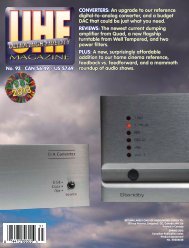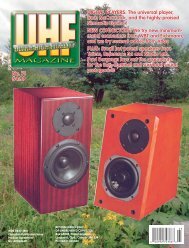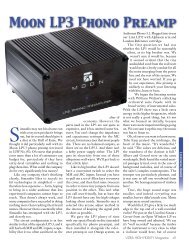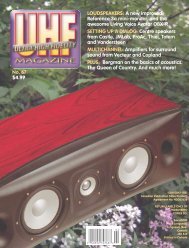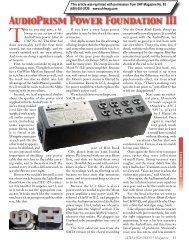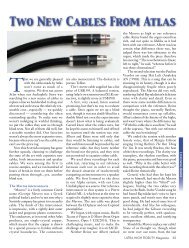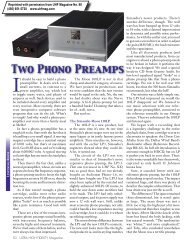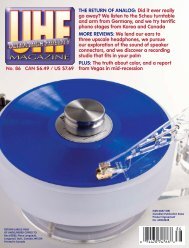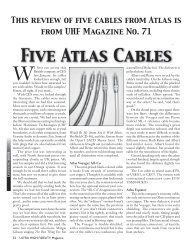A Terrific Tube Preamplifier From Korea, And A - Ultra High Fidelity ...
A Terrific Tube Preamplifier From Korea, And A - Ultra High Fidelity ...
A Terrific Tube Preamplifier From Korea, And A - Ultra High Fidelity ...
Create successful ePaper yourself
Turn your PDF publications into a flip-book with our unique Google optimized e-Paper software.
Painting from a Decca collection of Rachmaninoff concertos (with Ashkenazy and Previn)<br />
Software<br />
Feedback<br />
to be trying to practise in a bungalow<br />
at the stylishly named Gardens of Allah<br />
in Hollywood when Harpo Marx, next<br />
door and also there to practise, took<br />
exception to his dogged repetition.<br />
Marx’s revenge was to open his doors and<br />
windows and play the first four bars of<br />
the C sharp minor Prelude fortissimo for<br />
two hours straight. Rachmaninoff had to<br />
ask the manager to move him away from<br />
“that dreadful harpist.”<br />
Today, if you want to hear a comparison<br />
of the sonics of the early Edison<br />
and Victor acoustic recordings and the<br />
later Victor electrical recording, you<br />
can find a ten-minute You<strong>Tube</strong> video<br />
which demonstrates the differences very<br />
clearly. The piece used for the demo is<br />
(naturally)…the C sharp minor Prelude!<br />
(It can be found at: www.youtube.<br />
com/watch?v=6jKg0uGQxrM).<br />
Back in Russia in 1899 after his British<br />
visit, Rachmaninoff composed only a<br />
couple of occasional pieces, including one<br />
68 ULTRA HIGH FIDELITY Magazine<br />
in praise of champagne entitled Were you “Mr. Rachmaninoff, nobody knows you<br />
hiccuping? dedicated to a young woman yet, but you will be a great man one day.”<br />
friend, Natalia Satin. She was one of It appeared things were looking up. Back<br />
the daughters of the aunt who had taken in Moscow Rachmaninoff completed<br />
him in after he left Zveref in 1889, and the second and third movements of<br />
she was to become his wife in 1902. The the Second Piano Concerto; indeed so<br />
dedication facetiously declared, “No, my many ideas had he that a second, exu-<br />
Muse has not died,” which makes one berant Suite for two pianos, Op. 17, was<br />
wonder if at this point Rachmaninoff composed.<br />
did not fear the opposite.<br />
Rachmaninoff’s Piano Concerto No. 2<br />
Hoping to bring him inspiration, is now so often played that familiarity<br />
a well-connected friend arranged for can get in the way of a real listen. Its<br />
Rachmaninoff to meet the writer Leo themes are well-known in part because<br />
Tolstoy. What actually happened at many have been lifted for pop songs,<br />
that meeting was recounted in at least including Full Moon and Empty Arms,<br />
two different versions by Rachmaninoff This Is My Kind of Love and All By Myself.<br />
himself, but it is certain that Tolstoy At the movies, it formed the soundtrack<br />
was of little comfort. He exhorted the of the 1945 Brief Encounter and parts of<br />
younger man to hard work, after which it turned up in The Seven-Year Itch. First<br />
Rachmaninoff was asked to perform. performed on October 27, 1901 with<br />
Accompanying Chaliapin, he played Rachmaninoff as soloist (his first such<br />
Fate, later included in Op. 21, but perhaps appearance in eight years), it is now one<br />
not his best song. Tolstoy’s reaction was of the great concertos of the Romantic<br />
to consign Rachmaninoff’s music to repertoire.<br />
the dustbin along with Beethoven’s(!), Rachmaninoff’s critics have argued<br />
and the writings of Pushkin for good that his Romanticism places him nota-<br />
measure. “Tell me, is such music needed bly behind the times, even though<br />
by anyone?” he asked, looking at the the Romantics are said to begin with<br />
composer directly. Though being put Beethoven, reach an apogee with Schu-<br />
into the same basket as Beethoven and bert and Brahms in the mid-19<br />
Pushkin might have been flattering,<br />
Rachmaninoff was much discouraged.<br />
The Satins decided that measures<br />
must be taken. Rachmaninoff’s aunt<br />
Varvara had recently been treated successfully<br />
by a hypnotist, Dr. Nikolai<br />
Dahl. During the first months of 1900,<br />
Rachmaninoff saw him every day, hearing<br />
over and over, by his own account,<br />
such posthypnotic suggestions as You<br />
will begin to write your concerto... you will<br />
work with great facility... the concerto will<br />
be excellent. Results were not immediate,<br />
but a few months later Rachmaninoff<br />
started work on his Second Piano Concerto,<br />
destined to become his best-known<br />
work. He dedicated it to Dahl.<br />
Following his hypnosis treatment,<br />
Rachmaninoff went on vacation to the<br />
Crimea. In Yalta his friend Chaliapin<br />
sang a recital which included songs by<br />
Rachmaninoff, and after the performance<br />
a small man with a beard came<br />
backstage to congratulate the singer.<br />
This was the playwright Anton Chekhov,<br />
and once done with Chaliapin he<br />
turned to the composer and told him,<br />
th century<br />
and decline with John Philip Sousa and<br />
Engelbert Humperdinck in the 20th .<br />
In any case such a classification may<br />
create expectations in the listener but it<br />
does not make a lot of difference to the<br />
composer. Rachmaninoff said of himself<br />
that he did not really understand modern<br />
Why a free version? music and was not able to write it. That<br />
did not mean he condemned it, for in fact<br />
For years now, we have been publishing,<br />
he<br />
on<br />
was<br />
our<br />
eloquent<br />
Web site,<br />
in his<br />
a free<br />
praise<br />
PDF<br />
of Stravin-<br />
version of our magazine.<br />
sky. His own take on the nature of music<br />
The reason is simple. We know you’re<br />
was<br />
looking<br />
given<br />
for<br />
around<br />
information,<br />
1933 to<br />
and<br />
a Mr. Walter<br />
that is almost certainly why you’ve come to<br />
Koons,<br />
visit our<br />
who<br />
site.<br />
wrote<br />
<strong>And</strong><br />
to<br />
that’s<br />
request<br />
why<br />
it. As he did<br />
we give away what some competitors consider<br />
in music,<br />
to be<br />
Rachmaninoff<br />
a startlingly large<br />
paints a picture.<br />
amount of information…for free.<br />
“Music is a calm moonlit night, a rustle<br />
We would give it all away for free, if we<br />
of<br />
could<br />
summer<br />
still<br />
foliage.<br />
stay in business.<br />
Music is the distant<br />
Recent figures indicate that each issue<br />
peal<br />
is getting<br />
of bells<br />
downloaded<br />
at eventide!<br />
as many<br />
Music is born<br />
as 100,000 times, and that figure keeps growing.<br />
only in the heart and it appeals only to<br />
Yes, we know, if we had a nickel for each<br />
the<br />
download…<br />
heart; it is Love! The sister of Music<br />
Truth is, we’re in the business of helping<br />
is Poesy,<br />
you enjoy<br />
and<br />
music<br />
its mother<br />
at home<br />
is Sorrow!’<br />
under the best possible conditions. <strong>And</strong> movies<br />
By<br />
too.<br />
1901<br />
We’ll<br />
Rachmaninoff<br />
do what we need<br />
had been<br />
to do in order to get the information to you.<br />
spending all or part of the summer at<br />
Of course, we also want you to read our<br />
Ivanovka<br />
published<br />
where<br />
editions<br />
the Satin<br />
too. We<br />
daughters also<br />
hope that, having read this far, you’ll want<br />
stayed.<br />
to read<br />
During<br />
on.<br />
the winters he lodged in<br />
a good-sized suite in their house. He<br />
and the eldest daughter, Natalia Satin,<br />
also a pianist, had grown close, but their



